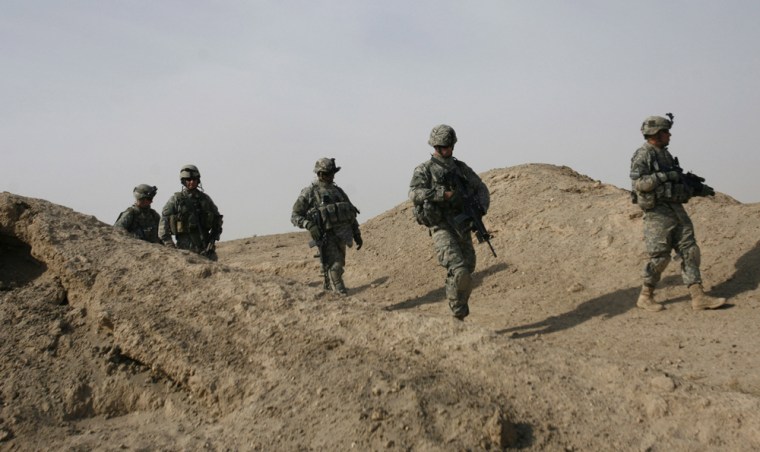Hundreds of American and Iraqi troops backed by helicopters descended Friday on a remote desert area southwest of Baghdad to root out al-Qaida in Iraq and search for two U.S. soldiers missing after a deadly insurgent ambush six months ago.
Acting on intelligence, the soldiers dug with shovels through heaps of sand and went house-to-house after a dramatic pre-dawn air assault into two Sunni villages near the boundary with Anbar province.
U.S. officers said there was no sign of the missing soldiers but stressed it was only the first day of the operation dubbed Marne Courageous, which also aimed to establish a long-term presence west of the Euphrates River in a former al-Qaida stronghold.
Col. Dominic Caraccilo, the commander of the 3rd Brigade Combat Team, 101st Airborne Division, said his troops were taking advantage of anti-al-Qaida sentiment among Sunnis that the military says has played a major part in reducing the violence in Baghdad and surrounding areas.
“The more safe it gets, the easier it is for us to move around and the more we can interact with the populace,” Caraccilo said in a telephone interview. “The more we can interact with the populace, the more they will tell us things.”
Early-morning assault
The raids began about 4 a.m. after two Chinook helicopters and eight Black Hawks making multiple runs dropped more than 600 U.S. and Iraqi soldiers into the villages of Owesat and Betra, about 15 miles southwest of the Iraqi capital.
Other troops built a roughly 500-foot-long bridge across the river to allow the transport of materials and supplies for a patrol base, which Caraccilo said would take about a month to build.
American F-16 fighter jets dropped two 2,000 pound bombs on an island in the river that was believed to be used by al-Qaida as a staging ground for attacks.
Spc. Alex R. Jimenez of Lawrence, Mass., and Pvt. Byron W. Fouty of Waterford, Mich., were seized May 12 when insurgents attacked and overran a checkpoint in the volatile area south of Baghdad known as the “triangle of death.”
A third soldier, Pfc. Joseph Anzack Jr., was also captured during the raid, but his body was found May 23 floating in the Euphrates River. Four U.S. soldiers and an Iraqi translator were killed during the ambush.
The Islamic State of Iraq, a front group for al-Qaida, claimed in an Internet video that the three missing soldiers were killed and buried. The militants showed images of the military IDs of Jimenez and Fouty but offered no proof that they were dead.
Long hunt for kidnapped soldiers
On June 16 the U.S. military disclosed that it had found the identification cards of Jimenez and Fouty in an al-Qaida safe house near Samarra, more than 100 miles north where they disappeared. The house contained video production equipment, computers and weapons but no people, officials said.
The two soldiers are assigned to the 4th Battalion, 31st Infantry Regiment, 2nd Brigade, 10th Mountain Division at Fort Drum, N.Y., which has since returned to the United States.
Caraccilo’s unit took over last month from the 10th Mountain Division but promised to continue the search.
“There have been a series of different sources and a lot of different avenues that led us to this area looking for al-Qaida and of course the missing soldiers,” he said.
Four men detained in raid
The daylong search turned up weapons caches and at least two makeshift bombs, and four men suspected of links to terrorism were detained, Caraccilo said. No casualties were reported.
Associated Press photos showed a woman shrouded in black watching as soldiers dug in the sand while others guarded the perimeter. Soldiers said she claimed bodies were buried in the area, but officials declined to comment on specific tips and insisted they remained optimistic the soldiers were alive.
“It was based on intelligence that we had gleaned over past months,” said Maj. Alayne Conway, spokeswoman for Maj. Gen. Rick Lynch, who commands U.S. troops south of Baghdad. “We go ahead and act on any bit of intelligence that we get in our search for the missing soldiers.” Meanwhile, U.S. troops also killed two al-Qaida-linked militants and detained 12 in raids southeast of Baghdad and in Ramadi, Mosul and Kirkuk, the military said.
Iraqi police said eight al-Qaida fighters were killed in a separate incident in a Shiite village near Muqdadiyah, about 60 miles north of Baghdad. Shiite townspeople, backed by police, drove the Sunni militants out of the village and killed eight of them, police said.
Violence persists
But militants continued to defy stepped-up security operations, with at least 18 Iraqis killed or found dead on Friday.
Attacks included a bombing that killed a civilian outside a motorcycle store in central Baghdad and a roadside explosion that killed three police officers on a patrol in Baqouba, northeast of the capital.
Also Friday, the chairman of a key committee in Iraq’s parliament said a draft law that would allow former members of Saddam Hussein’s Baath Party to hold government jobs is unconstitutional.
The new law was submitted to parliament this week. If approved, it would relax curbs on former Baath Party members — a key demand of the U.S. and Sunni Arabs.
But the head of parliament’s “de-Baathification Committee,” Falah Hassan Shanshal, said Friday that language in the draft law violates the constitution. Among other things, Shanshal said the law might open government jobs to low-ranking Baath members who had still committed crimes and would trigger a backlash among Iraqis — especially Shiites.
